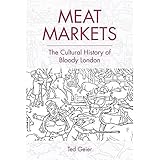Meat Markets : The Cultural History of Bloody London / Ted Geier.
Material type: TextPublisher: Edinburgh : Edinburgh University Press, [2022]Copyright date: ©2017Description: 1 online resource (200 p.) : 9 B/W illustrationsContent type:
TextPublisher: Edinburgh : Edinburgh University Press, [2022]Copyright date: ©2017Description: 1 online resource (200 p.) : 9 B/W illustrationsContent type: - 9781474424714
- 9781474424721
- 820.9008 23
- PR468.A56 G45 2017
- online - DeGruyter
| Item type | Current library | Call number | URL | Status | Notes | Barcode | |
|---|---|---|---|---|---|---|---|
 eBook
eBook
|
Biblioteca "Angelicum" Pont. Univ. S.Tommaso d'Aquino Nuvola online | online - DeGruyter (Browse shelf(Opens below)) | Online access | Not for loan (Accesso limitato) | Accesso per gli utenti autorizzati / Access for authorized users | (dgr)9781474424721 |
Frontmatter -- Contents -- List of Figures -- Acknowledgements -- Introduction: ‘A condition more abject . . .’ Meat City and Nonhuman Objects -- Chapter 1 A Parliament of Monsters: Romantic Nonhumans and Victorian Erasure -- Chapter 2 Meat without Animals: Outcast Objects and the Improvement of London -- Chapter 3 Mass Production: Impossible London’s Criminal Subjects -- Conclusion: Post-meat -- Index
restricted access online access with authorization star
http://purl.org/coar/access_right/c_16ec
Abjective ecologies of British humans, animals, and other nonhumans in cultural forms of nineteenth-century literature, from Dracula to BovrilMeat Markets articulates the emergent ‘nonhuman thought’ developed across literatures of the long nineteenth century and inflecting recent critical theories of abject life and animality. It presents important connections between meat and popular serial press industries, the intersections of criminals and public readership, and the long history of bloody spectacle at London’s Smithfield Market including public executions, criminal escapades, death and horror tales, and the fungible ‘penny press’ forms of mass consumption. Through analysis of subjection, address, and narration in canonical and penny literatures, this book reveals the mutual forces of concern and consumption that afflict objects of a weird cultural history of bloody London across the long nineteenth century. Players include butchers, Smithfield, Parliament, Dickens, Romantics, Sweeney Todd, cattle, and a strange, impossible London.Key FeaturesArticulates the emergent ‘nonhuman thought’ developed across literatures of the long nineteenth century and inflecting recent critical theories of abject life and animalityShows the productive contradictions in social and animal concern as it produces anonymous, ‘biopolitical’ objects in literature, food culture, and London societyPresents important connections between meat and popular serial press industries, the intersections of criminals and public readership, and the long history of bloody spectacle at London’s Smithfield Market including public executions, criminal escapades, death and horror tales, and the fungible ‘penny press’ forms of mass consumption
Mode of access: Internet via World Wide Web.
In English.
Description based on online resource; title from PDF title page (publisher's Web site, viewed 29. Jun 2022)


